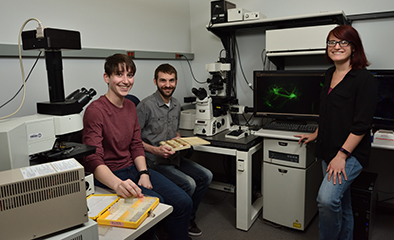CBMP Faculty
Donna Beer Stolz, Ph.D.

Department: Dept of Cell Biology
Email: dstolz@pitt.edu
PubMed: Link
Dept / Lab Webpage: http://www.cbp.pitt.edu/faculty/stolz.html
CBMP groups: Cell Communication, Signaling and Ion Channel Biology, Cellular Injury, Wound Healing, Aging and Tissue Regeneration
Research Interests
Angiogenesis is the process whereby new blood vessels sprout from existing vessels and requires that the specialized resident cells lining the vasculature, the endothelial cells (ECs), proliferate, migrate and differentiate spatially and temporally in response to specific signals. Vasculogenesis, on the other hand, has only recently emerged as an alternative mechanism of blood vessel growth in adult tissues and is the result of homing and engraftment of circulating EC precursors (ECPs) of bone marrow origin to sites of neovascularization. Both events are known to occur within the liver vasculature under very different conditions of growth, injury and repair, but the extent of each and the mechanisms by which they occur for each case is completely unknown. We evaluate the growth factor signaling events that accompany blood vessel growth and repair during liver regeneration following partial hepatectomy, and as the result of ischemia/reperfusion injury following liver transplantation. Comparative analysis of these two systems will elucidate both similar and dissimilar mechanisms that control these events and potentially lead to optimization of therapies that will reflect the specific requirements for injury based neovascularization in the liver.
